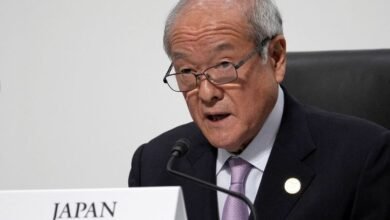UK finance chief Reeves pledges most ‘pro-business’ government

Chancellor Rachel Reeves gives a speech at the Treasury on July 8, 2024 in London, England.
Pool | Getty Images News | Getty Images
“This is going to be the most pro-growth, pro-business Treasury that this country has ever seen,” Reeves told CNBC’s Steve Sedgwick via remote interview.
“I will work with business to make sure we’re doing all we can to bring wealth creation, to bring business investment to the U.K. economy,” she added.
Reeves, who has been in post for three weeks following Labour’s landslide victory in the U.K.’s July 4 general election, was speaking from Rio de Janeiro, Brazil where she is attending a meeting of G20 finance ministers.
The chancellor said she has already met with business leaders who are interested in doing business in the U.K. She acknowledged, however, that businesses needed more clarity on taxation.
On Monday, Reeves will outline the results of an audit of the Treasury, in which she is expected to reveal a £20 billion ($25.7 billion) black hole in the public finances.
The announcement could pave the way for a tax-rising Autumn Budget, the first major fiscal event of the new government. The date of the financial plan will also be announced Monday.
Reeves declined to comment on the precise details, saying “issues around taxes are rightly for the budget.” But she added that she wants to ensure Britain has a “competitive tax system.”
“I want taxes to be as low as possible, but unlike the previous government I’m not going to make promises that I’m not able to keep, and without being able to say where the money’s going to come from. The number one mission of this new government is to grow the economy, and to grow the economy we need to attract wealth creators to Britain,” she said.
“We can’t tax and spend our way to higher growth and to greater prosperity. We need to attract business investment to be able to do that.”
Reeves has previously ruled out increases to income tax, national insurance, VAT or corporation tax — the main sources of government revenues. However, the chancellor has a fine balance to tread given pledges from her party to also boost national investment and public sector pay.
Prime Minister Keir Starmer indicated on Wednesday that there would be tough fiscal decisions ahead, telling parliament that his government faces “a more severe crisis than we thought” as its goes through the books of the last 14 years of Conservative rule.
The centre-left leader has vowed to take a hard line on public spending until the country’s finances are back in order. On Tuesday he suspended seven party members who voted against him on a proposal to scrap the two-child benefits spending cap.
Labour’s pledge to return the country to economic growth was again reiterated as a “fundamental mission” in the King’s Speech last week, as the country seeks to emerge from its cost of living crisis.
Among the economic measures previously announced by the government are the nationalization of rail operators and the creation of a publicly-owned clean power company, as well as further investment in public services and the creation of new homes.
The G20 meeting marks an early outing for the new finance minister, who heralded the opportunity “to reset” some of Britain’s relationships with its international counterparts.
The comments echo similar remarks made by Starmer at the European Political Community summit last week, as he seeks to distance his government from the former U.K. leadership.
Watch CNBC’s full interview with Rachel Reeves on Monday, July 29.
Source link




